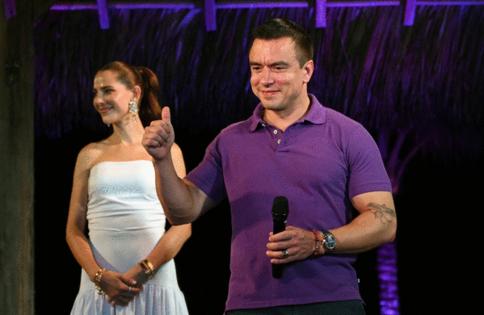Trump ally Noboa reelected in an Ecuador torn apart by gangs
Published in Political News
Ecuador’s electoral authority declared President Daniel Noboa the winner of Sunday’s election, giving him a full four-year term to try to rein in cocaine violence and rouse the economy from its lost decade.
Socialist opposition candidate Luisa González declined to concede, however, and demanded a recount.
With 94% of ballots tallied, investor favorite Noboa, 37, led González by 55.8% to 44.2% Electoral authority chief Diana Atamaint said that this gap and an “irreversible trend” made Noboa the victor.
González told supporters in Quito that she didn’t recognize the official vote count, which she said didn’t tally with polling data. She would need to produce evidence of irregularities for the electoral authorities to consider a recount.
Noboa’s lead of more than a million votes means that González’s attempts to overturn the result are unlikely to prosper, said Arturo Moscoso, Dean of political science at Ecuador’s International University in Quito, in a phone interview.
Noboa’s victory will likely cheer owners of the Andean nation’s sovereign bonds, which are the worst performers in emerging markets this year. The slump began after González did much better than polls had forecast in the first round, raising the possibility of the return to power of a party that oversaw a debt default in 2008.
The nation of 18 million people was close to the abyss when Noboa took over as interim president in 2023, with drug gangs gunning down politicians, nationwide blackouts and tens of thousands of people trying to flee to the US. Sixteen months later, none of those problems has been fixed and the outlook is hardly any rosier.
But Noboa, a wealthy 37-year-old businessman on good terms with Donald Trump, persuaded voters to give him more time to halt the country’s slide. He won helped by a social-media campaign that featured him working out, dancing and bragging about his tough approach to fighting crime.
Noboa might seem an unlikely figure to lead the fight against the powerful gangs that have overrun the country in alliance with mafias from Mexico, Colombia and Albania.
After a privileged childhood as a scion of wealthy banana exporters, Noboa studied at a series of US universities, including the Harvard Kennedy School of Government and George Washington University. His family has elite connections far beyond Ecuador, including a friendship with the family of Robert F. Kennedy Jr., Trump’s Health Secretary.
Noboa was one of only three Latin American presidents to attend Trump’s inauguration, along with El Salvador’s Nayib Bukele — another very young leader who owes a lot to social media — and Argentina’s Javier Milei.
Tide of cocaine
Ecuador’s state urgently needs to recapture gang territory, stem the tide of cocaine flowing across its borders with Colombia and Peru, and take control of ports infiltrated by traffickers, according to Mario Pazmiño, a former head of Ecuador’s military intelligence.
“The next two years are going to be critical,” Pazmiño said. “There’s going to be a much more entrenched presence of international mafias and regional cartels as well as local gangs.”
In recent years, gangs spread from their heartland on Pacific coast into the Andes and Amazon regions, and pushed Ecuador’s murder up more than 700% in the five years before Noboa took office.
The rise in extortion and kidnapping is also acting as a brake on economic activity, according to María Paz Jervis, president of Ecuador’s Committee of Entrepreneurs, a business lobby.
“We have zones where security companies won’t even accompany delivery trucks,” Jervis said in an interview in Quito. “So we’re not just talking about protection rackets anymore.”
The economy probably shrank for four straight quarters last year, the former OPEC member is close to becoming a net fuel importer, and cartel hitmen made the first quarter the country’s bloodiest on record. As well as disorder, activity has been held back by power blackouts and a long-term decline in oil production.
State of emergency
Noboa’s popularity soared at the start of 2024 when he declared a state of emergency and put the army on the streets, and crime temporarily plunged. While that failed to fix Ecuador’s gang problem, it did help Noboa revive the nation’s fortunes on Wall Street.
He took advantage of his high approval ratings to push through unpopular measures such as a VAT increase and a phasing out of gasoline subsidies, laying the groundwork for a $4 billion deal with the International Monetary Fund.
When he took office, the government was barely able to pay its own workers. Now its finances are less fragile since he came to power though snap elections in 2023 after President Guillermo Lasso dissolved congress to avoid impeachment. He is serving out what would have been the remainder of his predecessor’s term until May 2025, and will now be in office through 2029.
The economy will expand 1.2% this year, the slowest pace in South America, according a forecast from the IMF. Even that modest level of growth is at risk if reservoir levels fail to recover sufficiently and the nation suffers another extended dry spell. Ecuador depends on hydro power for about 70% of its electricity.
©2025 Bloomberg L.P. Visit bloomberg.com. Distributed by Tribune Content Agency, LLC.




























































Comments